#information science
Text
Feeling like the ultimate nerd niche right now. I’m studying information science, specifically cataloguing, while in a library. Immersive experience. Like a 4D movie.
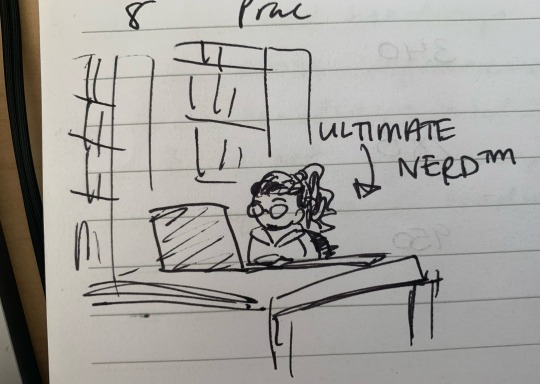
Self-portrait on Lined Notebook Paper, c. 2023
#ren rambles#library#libraries#information science#library and information science#cataloguing#my art#ren doodles#doodle#doodling
4K notes
·
View notes
Text
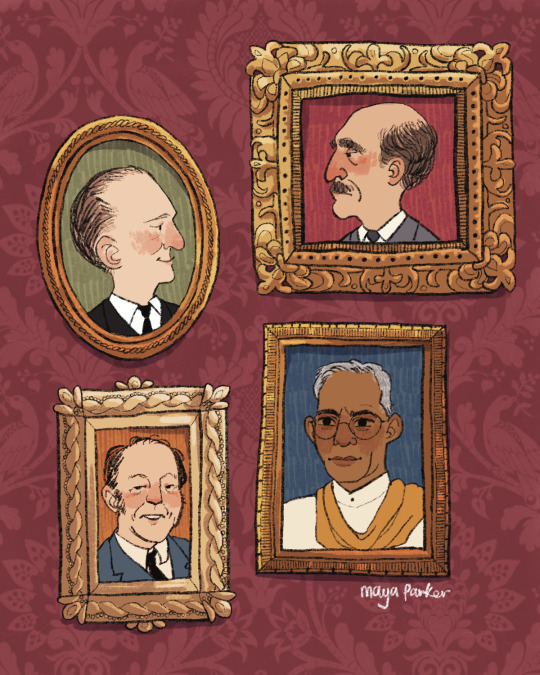
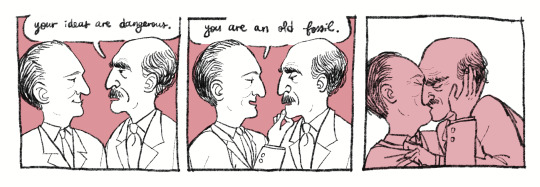
old men yaoi. no this isn't any fandom, these are prominent academics in my field (and the field adjacent). the two in the comic hated each other a lot but those are real quotes or paraphrases that they said about each other. i will not apologize
#tr schellenberg#hilary jenkinson#sr ranganathan#robert s taylor#academia#archival studies#library studies#information science#my art#i am insane.
255 notes
·
View notes
Text
Revised and Expanded Library Poll:
276 notes
·
View notes
Text

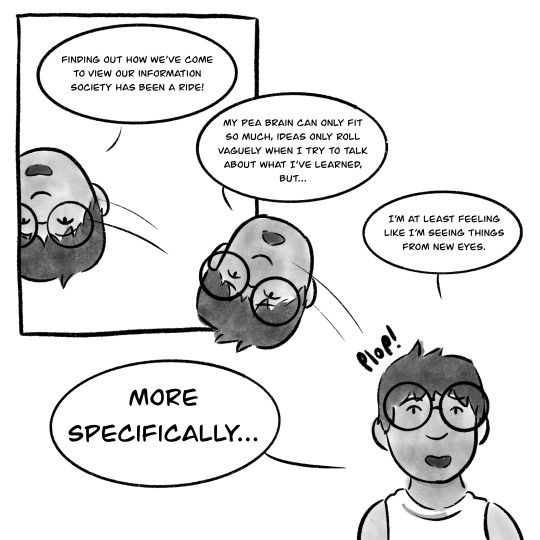
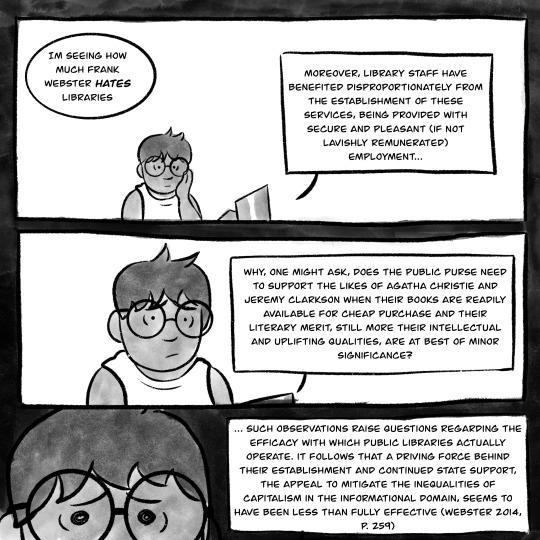

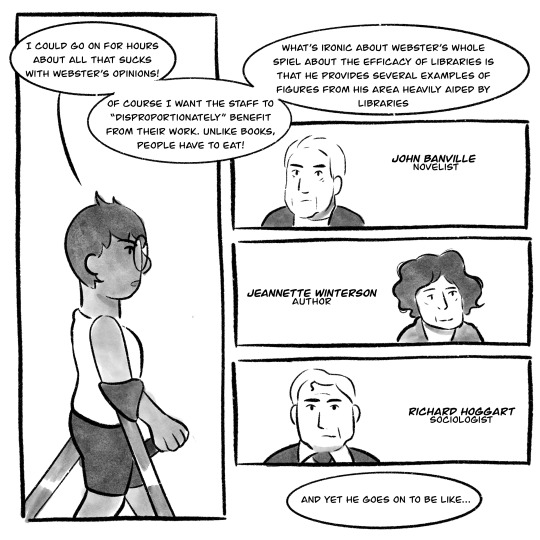

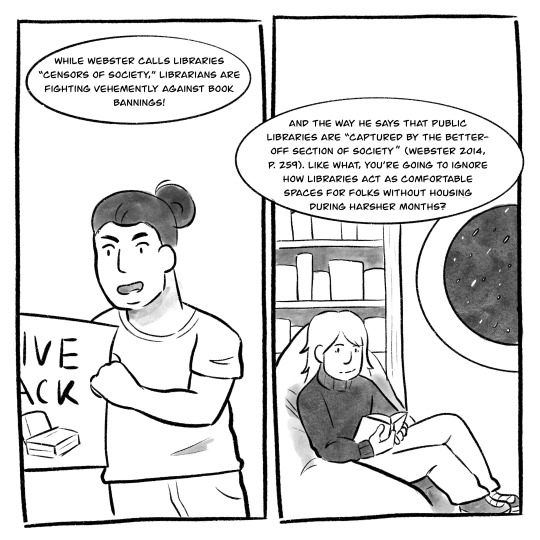

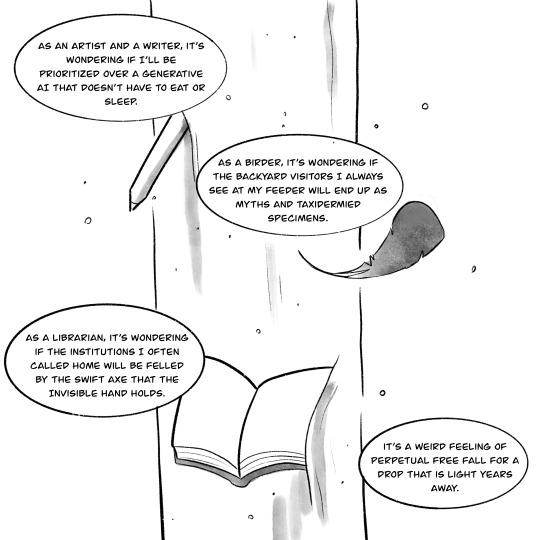

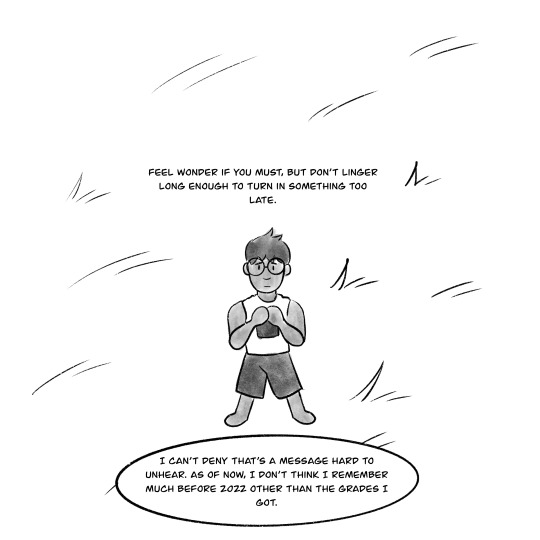
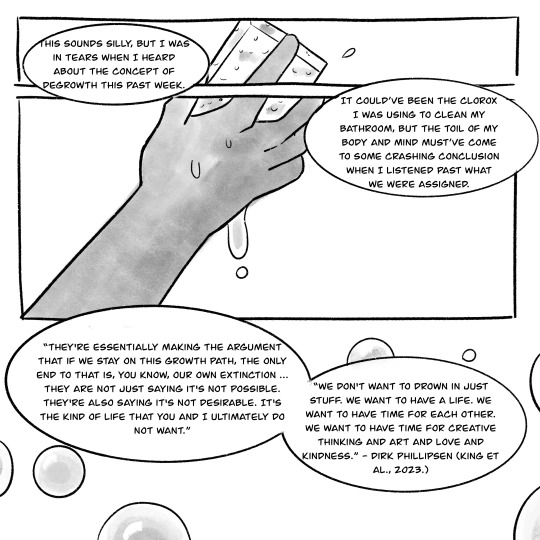
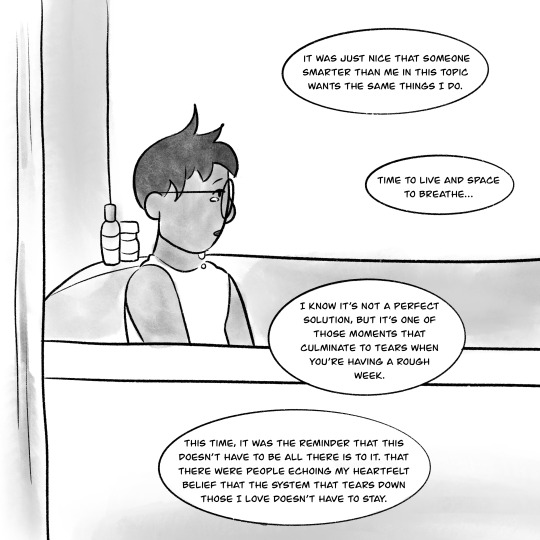
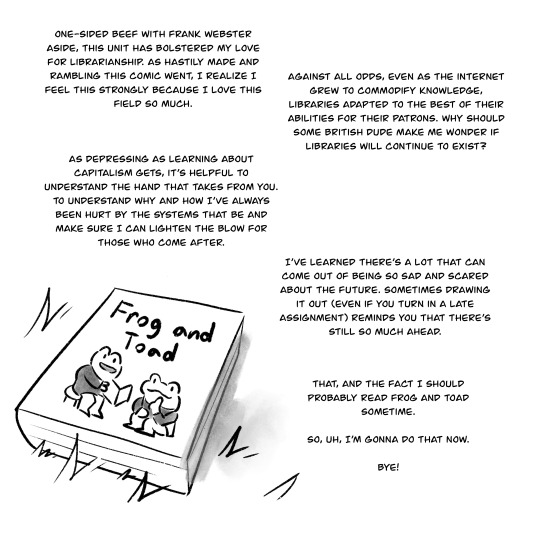

Worth Existing (or, Frank Webster Gives Keegan An Existential Crisis)
been busy this semester, but have a reflection comic I got away with making for an information history class! it's rambling, but i had some fun digesting my thoughts.
image descriptions from alt: The title page contains the title “Worth Existing, or: Frank Webster gives Keegan an existential crisis.” In front of a mirror, Keegan stands with their back facing the viewer as a reflection of them as a librarian looks back worriedly.
Page 1 features a sequential cartoonish sequence of Keegan’s head rolling and landing on his shoulders. He says: “Finding out how we’ve come to view our information society has been a ride. My pea brain can only fit so much, ideas only roll vaguely when I try to talk about what I’ve learned, but I’m at least seeing things from new eyes. More specifically…”
Dialogue continues on Page 2, 3 panels sequentially zoom in on a horrified Keegan. She says, “I’m seeing how much Frank Webster hates libraries.” The quote from the book she’s reading is as follows: “Moreover, library staff have benefited disproportionately from the establishment of these services, being provided with secure and pleasant (if not lavishly remunerated) employment. Why, one might ask, does the public purse need to support the likes of Agatha Christie and Jeremy Clarkson when their books are readily available for cheap purchase and their literary merit, still more their intellectual and uplifting qualities, are at best of minor significance. Such observations raise questions regarding the efficacy with which public libraries actually operate. It follows that a driving force behind their establishment and continued state support, the appeal to mitigate the inequalities of capitalism in the informational domain, seems to have been less than fully effective.” End quote.
Page 3 has Keegan looking with hands clasped, paused. They then look at the camera, asking “Did the dude just insult Agatha Christie?” The bottom has them lying on their bed, looking up at the ceiling in thought, saying “There’s something that just bugged me ever since I read that chapter. I never really understood the theory we talked about in class, it’s a skill I’m working on, but the weird beef he has with libraries at least gave me a vibe on ‘Hayekian Neoliberalism.’ And also how weird it is that capitalism got so far into deciding what’s worth existing. If the thing I wanna do with my life is worth existing.”
On Page 4, Keegan walks with his crutches as the dialogue continues. “I could go on for hours about all that sucks with Webster’s opinions! Of course I want the staff to ‘disproportionately’ benefit from their work. Unlike books, people have to eat! What’s ironic about Webster’s whole spiel about the efficacy of libraries is that he provides several examples of figures from his area heavily aided by libraries. Panels feature novelist John Banville, author Jeannette Winterson, and sociologist Richard Hoggart. Keegan continues and says, “And yet he goes on to be like…”
Page 5, a sock puppet speaks angrily: “People are getting free books and are hurting the poor bookseller! Libraries are stupid because it doesn’t miraculously fix the inequalities of capitalism!” To the side, the text says “Artist’s exaggeration. Don’t take this seriously.” Bottom panel contains Keegan pointing with her thumb at Frank Webster’s Wikipedia page. She says, “I wouldn’t be so hung up if this was some random guy, but considering this guy is so largely quoted and touted in my field of information sciences? Ouch obviously doesn’t cut how much all that stung.”
Page 6 contains an Asian man with a bun protesting banned books. The next panel contains a white woman with a turtleneck reading in a library as a winter storm brews outside. Keegan off-screen says, “While Webster calls libraries ‘censors of society,’ librarians are fighting vehemently against book bannings! And the way he says that public libraries are ‘captured by the better-off section of society?’ Like what, you’re going to ignore how libraries act as comfortable spaces for folks without housing during harsher months?”
On Page 7 a gavel bangs on a panel. “As if that’s not enough, publishers are suing libraries for distributing e-books, calling them ‘direct economic competitors’ when, if anything, they often support these publishers and their authors by buying multiple copies, hosting events and collaborating with local businesses.” As an example, the comic features a scene of a Black woman in a cardigan talking to a white cashier with a shaved head. She says to them, “I just read this at my library earlier and just needed to get my own copy! Can’t believe it took me this long to discover this author!” A panel below, a pair of hands scoops sand and watches it flow from their fingers. Keegan says, “I don’t know. Even in good company, it sometimes feels like the future is slipping through my fingers.”
Page 8 is a pillar of falling sand. Embedded in it is an Apple pencil, a floating feather, and a book. Keegan narrates, “As an artist and a writer, it’s wondering if I’ll be prioritized over a generative AI that doesn’t have to eat or sleep. As a birder, it’s wondering if the backyard visitors I always see at my feeder will end up as myths and taxidermied specimens. As a librarian, it’s wondering if the institutions I often called home will be felled by the swift axe that the invisible hand holds. It’s a weird feeling of perpetual free fall for a drop that is light years away.”
Page 9, Keegan is holding a book to the sky as they read it. They narrate “Learning is a language I’ve always used to make sense of the thoughts I’ve had swirling in my brain. Finding out ‘information capitalism’ was a thing was like learning about the leash that has pulled at my throat since I entered the schooling system. I am learning because I am not a person, but a tool to be put to a trade. The world around me whispers in my ear…”
“Feel wonder if you must, but don’t linger long enough to turn in something too late.” On page 10, Keegan lies on a grassy field looking up with the book on his chest. He narrates, “I can’t deny that’s a message hard to unhear. As of now, I don’t think I remember much before 2022 other than the grades I got.”
On page 11, a hand wipes a bathroom wall with a sponge. The bottom of the page is filled with floating bubbles. Keegan narrates, “This sounds silly, but I was in tears when I heard about the concept of degrowth this past week. It could’ve been the clorox I was using to clean my bathroom, but the toil of my body and mind must’ve come to some crashing conclusion when I listened past what we were assigned.” The quote goes, They’re essentially making the argument that if we stay on this growth path, the only end to that is, you know, our own extinction. They are not just saying it’s not possible. They’re also saying it’s not desirable. It’s the kind of life that you and I ultimately do not want. We don’t want to drown in just stuff. We want to have a life. We want to have time for each other. We want to have time for creative thinking and art and love and kindness.” The quote ends. It comes from Vox’s Blame Capitalism: Degrowing Pains and is spoken by Dirk Phillipsen.
On page 12, Keegan sits in the bathtub with a few tears. Narration goes, “It was just nice that someone smarter than me in this topic wants the same things I do. Time to live and space to breathe. I know it’s not a perfect solution, but it’s one of those moments that culminate to tears when you’re having a rough week. This time, it was the reminder that this doesn’t have to be all there is to it. That there were people echoing my heartfelt belief that the system that tears down those I love doesn’t have to stay.
Page 13. A frog and toad book. “One-sided beef with Frank Webster aside, this unit has bolstered my love for librarianship. As hastily made and rambling this comic went, I realize I feel this strongly because I love this field so much. Against all odds, even as the internet grew to commodify knowledge, libraries adapted to the best of their abilities for their patrons. Why should some British dude make me wonder if libraries will continue to exist? As depressing as learning about capitalism gets, it’s helpful to understand the hand that takes from you. To understand why and how I’ve always been hurt by the systems that be and make sure I can lighten the blow for those who come after. I’ve learned there’s a lot that can come out of being so sad and scared about the future. Sometimes drawing it out (even if you turn in a late assignment) reminds you that there’s still so much ahead. That, and the fact I should probably read Frog and Toad sometime. So, uh, I’m gonna do that now. Bye!"
The references page lists several sources: Frank Webster’s “Theories of the Information Society.” An article by Brewster Kahle called, “The US library system, once the best in the world, faces death by a thousand cuts.” An article by Rachel Kramer Bussel called, “How Libraries Help Authors Boost Book Sales.” And a podcast episode from Vox’s Today Explained hosted by Noel King, titled “Blame Capitalism: Degrowing Pains.” end descriptions.
#art#artists on tumblr#comic#information science#academia#studyblr#library#libraries#library science#image described#image description in alt#accessible art#long post
53 notes
·
View notes
Text
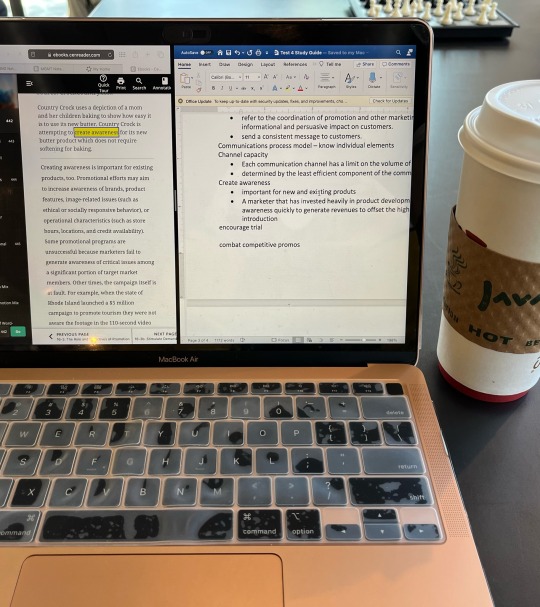

11.18.22 | a break would be nice
the past two and a half weeks have been stressful to say the least. with thanksgiving break and the end my internship coming up, it’s been a nonstop cycle of wake up early for school, work, then sleep.
i’ve been metaphorically attacked by 3 exams, 2 quizzes, one lab, and 4 internship projects these past two weeks. i’m also supposed to have a final project for my internship, but my boss hasn’t discussed any part of it like she said she would—and this week is my last.
cafe order ☕️: cinnamon spice tea
#studyblr#university#collegeblr#student#stemblr#college#study#academia#stem#stem major#information science
241 notes
·
View notes
Text
Hey Tumblr, what are reasons one would want to become a librarian? I'm writing a personal statement for grad school, Masters of Information Science. Thus far my reasons are:
-I'm interested in community services/resources and running helpful programs.
-I fucking love books.
-I have an English degree and I want to put it to use g-ddammit
-When I was younger libraries were a safe space for me. My stepdad used to ground me from going to the library cuz he's a dick and hated my happiness.
-I shadowed a librarian and it was really cool.
This needs to be a decent length tho and idk what else there is to write. Taking any and all suggestions (no guarantees they'll make it into my statement tho)
#help#grad school#library#libraries#library information science#information science#librarians#personal statement#tw emotional trauma#tw trauma#advice#college#books
69 notes
·
View notes
Text
5 notes
·
View notes
Text

Graph Comparing Positive-Negative Crowd Score Of Various Descriptors
#language#writing#psychology#positivity#negativity#writing tips#writers#information#information science#graphs#charts
14 notes
·
View notes
Note
If you're not too busy, would you mind blinding me with library science? Infosynth sounds like a useful skill and I'm far too dumb and lazy to go around reinventing the wheel all the time.
it is! unfortunately it’s not really something there is a lazy approach to - the lazy/time-strapped approach here is really to get someone else who has spent the time developing these skills to do infosynth for you: - this is why health librarians are an increasingly important part of healthcare provision, for instance, and it’s what I do as a freelancer for people whose time is at a premium.
it’s also something i have less experience teaching than a lot of other infolit skills; I do think you can really only get good/quick at it with a lot of practice.
but, if you’re interested in learning the good news is there are a lot of free librarian-compiled resources on this and other infolit skills available on the library websites of universities, which are usually accessible without an institutional log in.
Here is a decent one with links to some more in depth sources.
These are going to be aimed at an audience of people who are using these skills in an academic context, but the core skills are pretty cross-applicable.
What comes with practice is being able to very quickly evaluate things like
whether this source is worth using (relevant, reputable)
how much of it you need to read,
and how much information you need to save from each source in order to be able to do the synthesis part later without revisiting the source.
(There’s also finding good sources to begin with, but that’s a different skill.)
What is key imo is to start with a well-defined research question, or more informally a good sense of what you’re trying to find out and for what purpose, and who the audience of your synthesis is.
I like to use something like OneTab or Zotero that lets me easily save a bunch of pages that i can go back to later. I also like to do a decent amount of just reading around before i even try to do anything else. It’s important to sorta just get oriented with stuff so that i have the relevant context for making decisions about how i go about it when it comes to doing anything more rigorous.
But ultimately with infosynth you need to be at peace with the fact that you are the one doing the legwork. Yours is the long boring task of somewhat-rigorously locating and reading lots and lots of stuff in order that you might tease out the seeds of a good synthesis.
I hope this helps somewhat; this is one of the domain skills i turned out to be Just Good At and i do think that often makes me worse at teaching things!
if you have any sort of a connection with a university (or work in healthcare) it’s worth checking if tuition in this sort of thing is available to you through your library. Many of the people who have the option to take this up aren’t aware of it. you can sometimes get infolit tuition at public libraries too
13 notes
·
View notes
Text
Life update that I forgot to mention, I'm in grad school now for library and information science! Who would have thought? After working in libraries for the entire length of time that this blog has existed.
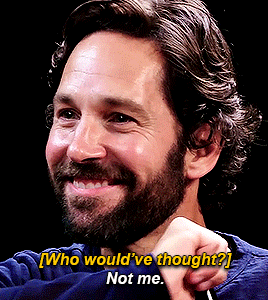
Anyways, I'm trying to figure out if anyone on here wants to commiserate. If you're an MLIS student or dealing with grad school I would love to post out in the void with you and procrastinate on assignments by shitposting
3 notes
·
View notes
Text
Interacting with cis men in college is such an exhausting experience sometimes.
A guy told me I’m not a STEM major as we were walking out of a chem class together. Like. Excuse me?
Then said coding wasn’t STEM, that my double major wasn’t comparable to pre-med majors, and devalued my entire field of study in the most horrible way possible!
“Who cares? They’re already dead.” - his actual real comment on humanitarian forensic anthropology efforts.
I just. I can’t.
#college#college is such a trip#anthropology#women in stem#information science#forensics#stem student
4 notes
·
View notes
Text
Me: Like, I know a lot of librarians hate the Dewey Decimal system, but at the library I work at I feel it’s actually fairly intuitive. It’s kind of like Fahrenheit--like sure it’s not really accurate, but as far as usage by people goes, it makes sense for the most part.
Me: *sees the way the Religion [DDC 200] is divided*
Me: *sees the way Language dictionaries are divided*
Me: *sees Phrenology of all fucking things is its own fucking section*
Me: *remembers the horror of all of the computer programming books crammed together at the very front of my library’s nonfiction section*
Me: ...okay yeah never mind I need to dig up Dewey and kill him again.
#dewey decimal system#libraries#information science#PHRENOLOGY IS GIVEN AS MUCH ORGANIZATIONAL ROOM AS SPACE--AS IN OUTER FUCKING SPACE
174 notes
·
View notes
Text
Since 1790, the decennial census has played a crucial role in creating and reshaping the ever-changing views of racial and ethnic identity in the United States.
Over the centuries, the census has evolved from one that specified broad categories — primarily “free white” people and “slaves” — to one that attempts to encapsulate the country’s increasingly complex demographics. The latest adaptation proposed by the Biden administration in January seeks to allow even more race and ethnicity options for people to describe themselves than the 2020 census did.
If approved, the proposed overhaul would most likely be adopted across all surveys in the country about health, education and the economy. Here’s what the next census could look like.
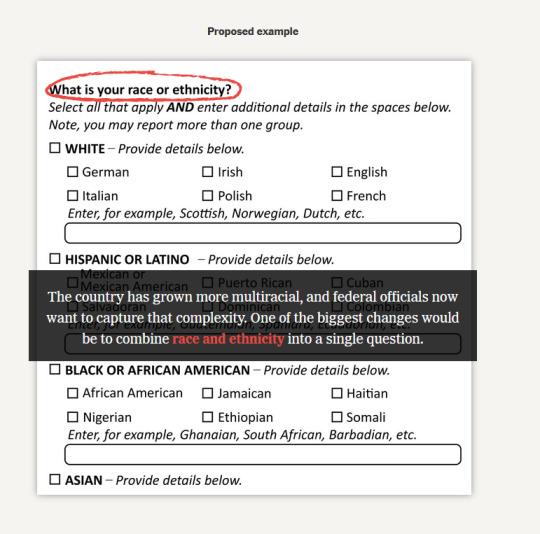
[ This article is a little interactive with floating text boxes etc, so its hard to screenshot effectively. ]
In some ways, the government is attempting to catch up with modern views of racial and ethnic identities.
There are complicated politics at work too, and the proposed changes have provoked criticism among some scholars and activists.
Many Hispanic or Latino U.S. residents mark “some other race,” typically because they don’t see themselves as “Black” or “white.” Supporters of the proposal say the changes reflect that Latinos have long been treated as a distinct racial group in the United States. But Afro-Latino scholars argue that the new method would mask important racial differences among Latinos.
Community leaders have been advocating for a “Middle Eastern or North African” category for years, pointing to the need for better data for this growing population, especially around health care, education and political representation. If the proposal is approved, this would be the first time since the 1970s that a completely new racial or ethnic category is added to the census.
A precise, universally accepted distinction between race and ethnicity does not exist. Instead, there’s a murky history of law, politics and culture around racial identity in America.
“There is no such thing as a perfect question,” said Roberto Ramirez, a population statistics expert at the U.S. Census Bureau. The bureau has conducted numerous tests in recent decades to improve the census so that people can more accurately identify themselves, he said.
If approved, the new race and ethnicity formulation will have wide-ranging impacts. Any organization receiving federal funding — down to local schools — would have to adhere to it. Race data informs how resources are distributed; whether equal employment policies and anti-discrimination laws can be enforced; and how congressional districts are drawn.
Ever since the census began measuring the U.S. population, race has been central to the counting. The census is more than a bureaucratic exercise; it embodies the country’s continued efforts to neatly categorize inherently nuanced and layered identities. Terms that are now widely viewed as outdated or even offensive had their place on the official forms for decades.
#census#data#information science#information access#civil rights#race and ethnicity#this is an interesting article if you can get access#i fucking hate paywalls but don't have the time to screenshot it all right now.
3 notes
·
View notes
Text
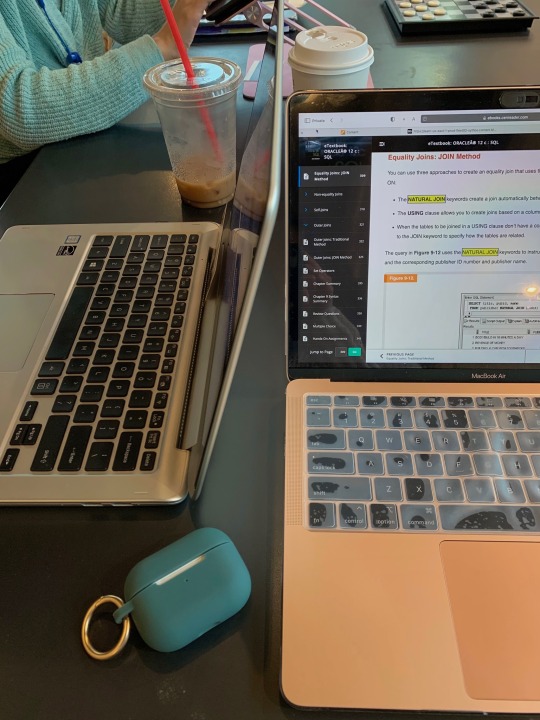
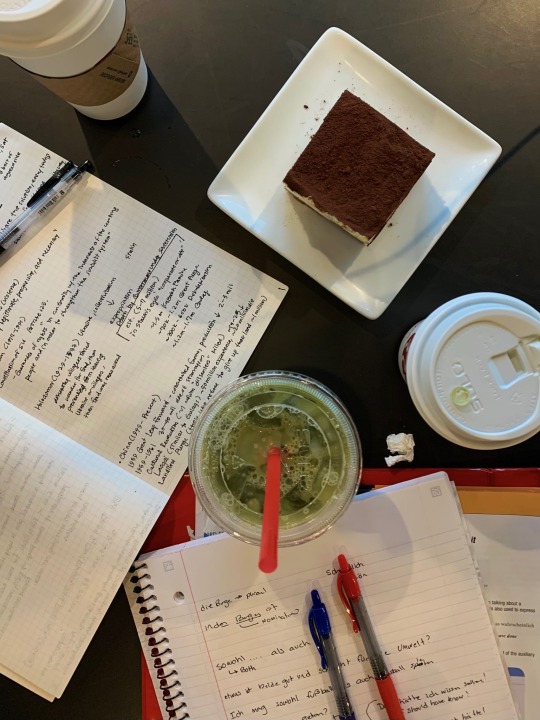
10.30.22 halloween eve 🎃
sunday study sesh with friends. surprisingly, we were productive. i finished a sql lab and studied marketing. the weather was dark and stormy—perfect for a day inside.
cafe order ☕️: vanilla latte, matcha latte, and blueberry cheesecake (not pictured)
#studyblr#university#student#college#stemblr#study#academia#stem#stem major#information science#programming#it#sql#collegeblr#my friends helped me take these pictures#that is my friend’s tiramisu#and those are their notes not mine
374 notes
·
View notes
Text
Can’t believe a giant avocado is gonna wipe out the South

22 notes
·
View notes
Text
Just out of curiosity (and because I’m writing a paper about it) what do y’all think about algorithmic content moderation? For or against?
5 notes
·
View notes